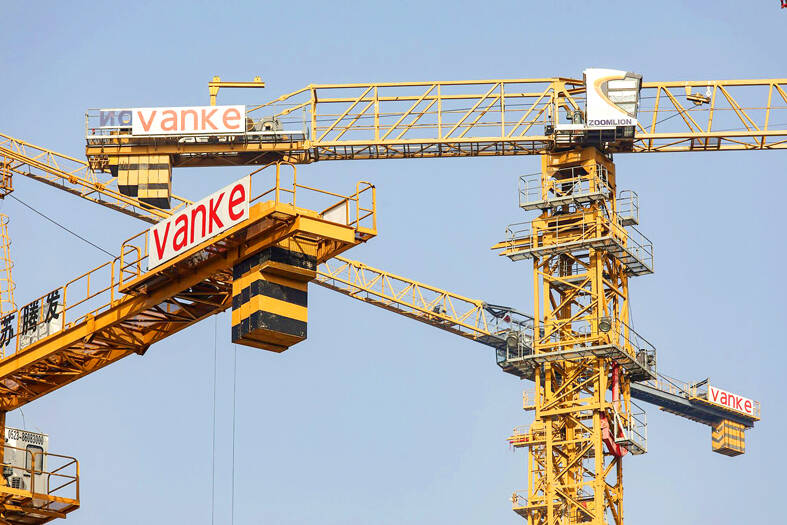China’s property debt crisis is showing new signs of trouble after entering its fourth year, with one of the country’s major state-backed developers under scrutiny by investors.
Some of China’s largest insurers are sounding an alarm over the debt risks of China Vanke Co (萬科), according to people familiar with the matter, as shares and bonds of the major developer hit record lows on repayment concerns.
At least two Beijing-based insurers that farm out annuity investments late last week told their external portfolio managers to closely monitor Vanke’s credit risks, the people said.

Photo: Bloomberg
One life insurer also told its pension managers to curb exposure, they said.
Vanke, China’s second-biggest developer by sales, has begun a new round of negotiations with several state insurers in the past few days to extend maturities of some private borrowings, the people said.
No deal has been reached.
In response to queries from Bloomberg, Vanke yesterday said that it has prepared funds to repay its 5.35 percent dollar bond due on Monday next week and that the payment is being arranged orderly.
The warnings about Vanke’s risks are particularly worrisome and threaten to elevate the sector’s debt woes to the next level because the company is seen as a bellwether for Beijing’s support for major developers with strong ties to the state.
The company is also one of China’s few remaining and surviving investment-grade builders, following a record wave of defaults that engulfed mostly private-sector builders, including former industry giants Country Garden Holdings Co (碧桂園) and China Evergrande Group (恆大集團).
The growing concerns about Vanke also come at an inconvenient time for authorities as the nation began its seven-day annual parliamentary sessions yesterday, with key policy topics from the housing crisis to local-government debt in focus.
Authorities pledged to refine real-estate policies to provide stronger support for the ailing sector, including treating developers equally regardless of their ownership.
“It is no surprise that Vanke is in trouble today,” Beijing Shengao Fund Management Co (深高基金管理) chief investment officer Li Kai (李凱) said. “Domestic real-estate sales have been so poor that it is difficult for companies to hang on, and the market has not seen strong visible support from local governments.”
Vanke had about 1.7 trillion yuan (US$236 billion) of assets and 1.3 trillion yuan of total liabilities as of the middle of last year, its interim report showed.
The builder on Friday last week said that it planned to raise about 1.16 billion yuan in an infrastructure REIT that would list in Shenzhen.

Intel Corp chief executive officer Lip-Bu Tan (陳立武) is expected to meet with Taiwanese suppliers next month in conjunction with the opening of the Computex Taipei trade show, supply chain sources said on Monday. The visit, the first for Tan to Taiwan since assuming his new post last month, would be aimed at enhancing Intel’s ties with suppliers in Taiwan as he attempts to help turn around the struggling US chipmaker, the sources said. Tan is to hold a banquet to celebrate Intel’s 40-year presence in Taiwan before Computex opens on May 20 and invite dozens of Taiwanese suppliers to exchange views

Application-specific integrated circuit designer Faraday Technology Corp (智原) yesterday said that although revenue this quarter would decline 30 percent from last quarter, it retained its full-year forecast of revenue growth of 100 percent. The company attributed the quarterly drop to a slowdown in customers’ production of chips using Faraday’s advanced packaging technology. The company is still confident about its revenue growth this year, given its strong “design-win” — or the projects it won to help customers design their chips, Faraday president Steve Wang (王國雍) told an online earnings conference. “The design-win this year is better than we expected. We believe we will win

Chizuko Kimura has become the first female sushi chef in the world to win a Michelin star, fulfilling a promise she made to her dying husband to continue his legacy. The 54-year-old Japanese chef regained the Michelin star her late husband, Shunei Kimura, won three years ago for their Sushi Shunei restaurant in Paris. For Shunei Kimura, the star was a dream come true. However, the joy was short-lived. He died from cancer just three months later in June 2022. He was 65. The following year, the restaurant in the heart of Montmartre lost its star rating. Chizuko Kimura insisted that the new star is still down

While China’s leaders use their economic and political might to fight US President Donald Trump’s trade war “to the end,” its army of social media soldiers are embarking on a more humorous campaign online. Trump’s tariff blitz has seen Washington and Beijing impose eye-watering duties on imports from the other, fanning a standoff between the economic superpowers that has sparked global recession fears and sent markets into a tailspin. Trump says his policy is a response to years of being “ripped off” by other countries and aims to bring manufacturing to the US, forcing companies to employ US workers. However, China’s online warriors